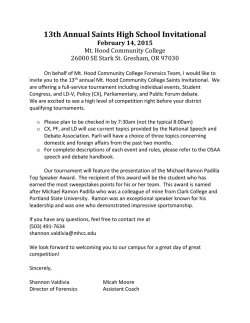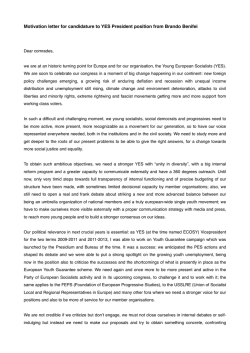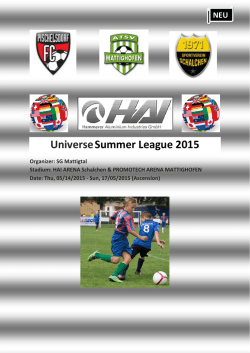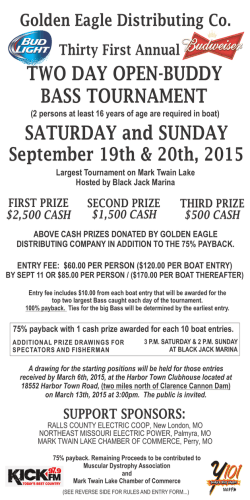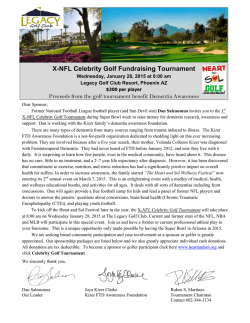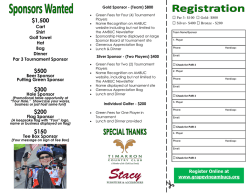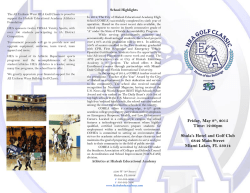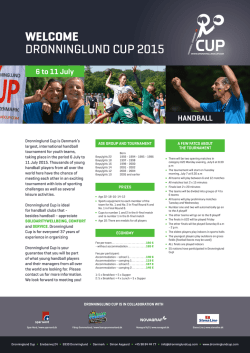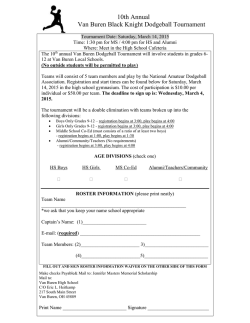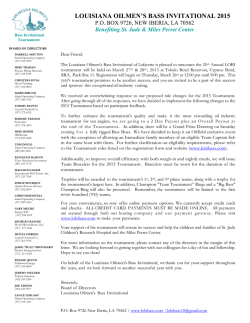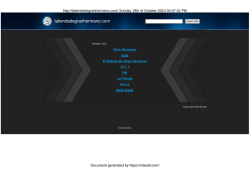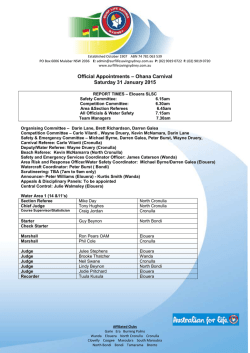
summary of chssa by-law changes january 2014 – january 2015
SUMMARY OF CHSSA BY-LAW CHANGES JANUARY 2014 – JANUARY 2015 JANUARY 2014 Issuance of stopwatches to judges Language moved from IE rules (IX) to State Tournament Administration (XIV) Reformatting: A stopwatch will be issued to each judging panel. The judges will be instructed to show that the time is cleared prior to each speech. At the conclusion of each speech the judge will announce the speaker’s time. At that time, the stopwatch will be shown to the other judges, if requested. Each judge will record the speaker’s time on his/her ballot. Eye Contact in Duo (IX) Modification of language for clarification re eye contact in duo Duo partners may not make eye contact with one another during the interpretation. In the event of eye contact, the duo will be penalized by no more than one rank by tab room officials. Eye contact during the introduction is optional, but allowed. Debate judging (XIV) Addition of a word to address practical issue of judge availability Section 2. Judging B. In Team Debate, Lincoln-Douglas Debate, Parliamentary Debate and Public Forum Debate three judges shall be used in each round up to and including the quarter-final round. in the semi-final round five judges shall be used. In the final round seven judges, including, ideally, four coaches from Areas not involved in the debate and three judges from the community, shall be used. No judge should score the same debate team or Lincoln-Douglas debater twice during the Tournament. No rule change – language moved in Article XI: Move/Delete from after the last table and insert after the section header: Article XI, Section 1, D5 to Article XI, Section 1, D D. Length and Order of Speeches in Each form of Debate A speaker’s time begins as to any given speech when she/he begins to speak. All speaking time must be timed, including “thank you’s” and “roadmaps”. Parli Prep Typo correction – Missing word added re length of prep time 3. Parliamentary Debate. Resolutions are different for each round of debate and are issued at the beginning of the twenty-minute preparation period of the round. Extemp Prep (IX) Limits talking during prep time Addition of language Preparation: As soon as a topic is chosen, the speaker will prepare a speech without consulting any person and without reference to notes prepared prior to the draw. The speaker may ask clarifying procedural questions of tournament officials. Entire Article IX: The State Tournament – Individual Events Rules replaced. See CHSSA website for full version Rules for use of Escripts Article IX, section 3 Electronically-sourced literary works, such as text published in online literary journals and magazines*, PDFs and e-reader content, are permitted as long as l)they are commercially and readily available; ii) they are nationally distributed and accessible; iii) the text has not been not been electronically altered or manipulated; iv) the submitted manuscript follows the preparation requirements for all v) the submitter is deemed to have assured, through the act of submission, interpretation events, including highlighting, legibility, added-words restrictions, etc. that the reproduction and use of the piece in a High School Speech and Debate Competition has not been done in violation of any applicable copyright laws, any laws relating to Digital Rights Management, including, but not limited to the Digital Rights Millennium Copyright Act, or any other law that might raise a question as to the legality of reproducing a work or reciting that work in competition. Each submitter of a script further acknowledges as a condition to submission of the script that s/he will assume sole responsibility for any violation of law that may occur by reason of the reproduction, submission, or recitation of any piece and will hold CHSSA harmless regarding same. CHSSA is not in a position to determine the legality of reproduction and recitation of any script, does not condone any violation of law in reproduction, submission, or recitation of scripts, and relies on the deemed assurances of the submitter as set forth herein in approving any script relative to CHSSA script format rules and allowing such a script to be used in any competition. In the event any third party claims the reproduction, performance, or recitation of the script to be in violation of any law, the submitter must either resolve the issue with the third party to its satisfaction, with written proof of same to CHSSA, or must withdraw the script and replace it with another. Proof of rules compliance should accompany the electronically-sourced script in one or more of the following forms: i) Title, Author, Table of Contents, Copyright page(s) and ISBN # if available ii) A receipt of purchase (if a copyright page does not exist, identical to the iii) A paper print-out of the website page from which the text was obtained, i.e. (preferred) allowances made for texts from Script City, Book City, Hollywood Collectibles, etc.) the company order page showing the option to purchase the text electronically iv) A photograph or screenshot of any of the above Restrictions: Online-sourced text must originate from a verifiable website that can be accessed universally by any user. The website and/or the electronic version of the digital text must be available for comparison with the printed script if challenged. Unacceptable online sources include but are not limited to: • Personal websites (social network profiles, blogs, etc.) • Publish It websites (those with one-click uploads or those which accept and post submissions without an editorial selection process) • Unmarked or casual websites where individuals can easily post compositions *An example of an acceptable online literary magazine is The Adirondack Review (www.theadirondackreview.com) which describes itself as “an independent online quarterly magazine of literature and the arts dedicated to publishing poetry, fiction, artwork and photography.” While it does encourage submissions, it posts its editorial guidelines for publication which makes this website an acceptable source. Congress changes to take effect in 2015 • Procedure change: Students to stay in same chambers Article XIII, Section 5A: Section 5. Paneling of Congressional Contestants A. There shall be three preliminary legislative sessions of ninety minutes each. Sessions 1 and 2 shall be randomly pre-matched and then balanced to avoid to the extent possible contestants meeting from the same school, the same League and the same Area. As of 2015, each chamber shall be shall be randomly pre-matched and then balanced to avoid to the extent possible contestants meeting from the same school, the same League and the same Area. Students will stay in the same chamber for all three preliminary rounds. • Judge votes added to Presiding Officer Competition Article XIII, Section 10E,a and G E. The four presiding officers shall be selected for the semi-final round based on the following criteria: a. Students and judges in each of the preliminary sessions must vote for the best presiding officer in that session. The presiding officer with the greatest number of votes in each session will be given a “win”. The four presiding officers with the most “wins” will advance to the semi-final round. G. The winner of each semi-final chamber, determined by the greatest number of student and judge ballots will serve in the final round. Ties shall be broken by judge’s preference. H. The presiding officer champion is determined by the greatest number of both student and judge ballots in the final round. Debate awards (XIV) Modifies language: includes Round 5 debaters (and beyond) in awards 1. Certificates: All participants in contest events in the State Tournament will be given appropriate certificates. 2. Awards of descending size shall be awarded to all finalists and semi-finalists in all events (except Congress) and to all debaters competing in and after Round 5 of their event. Setting Fees for State Modifies language – allows adjustment of entry fees for State Tournament B. State Tournament Fees: Contestant schools in the CHSSA State Tournament shall pay fees as outlined below: 1. An Entry fee per person per event. 2. A School Fee: …per school… All fee amounts will be set by the executive council. MAY 2014 – NO CHANGES SEPTEMBER 2014 2015 STATE TOURNAMENT EXTEMP TOPIC AREAS: Round 1: Round 2: Round 3: Semis: Finals: National Extemp International Extemp Politics/Government The Economy Science and Technology Culture Social Programs-education, entitlements, health Africa Middle East East Asia Europe The Americas 2015 STATE TOURNAMENT PARLI TOPIC AREAS: Round Topic Area Round Topic Area Round 1 Round 2 Education Environment Round 6 Round 7 Health Media Round 3 Round 4 Politics Technology Round 8 Round 9 Rights and Liberties Economy Round 5 National Security Entering State: State entry deadlines, penalties and appeals: Modification of Language - New language: Failure to meet state entry deadlines (online or postmark) will result in a $150 fine for the offending school per deadline. Sending in partial online entry or mailing partial entry forms or payments may be fined up to $150. In addition, failure to send notification of entry as required on or before the designated due dates (online or postmark) shall, result in disqualification of the entrants. The area chairperson shall then be authorized to substitute alternates. Both the coach of the disqualified entrant(s) and the alternate(s) shall be notified by telephone and email immediately. In extenuating circumstances, penalties may be appealed in writing to the state tournament committee within 72 hours of notification of fine. Judging Requirements at State Eliminates the Mandatory Community and College Judge Pools In lieu of a community/college judge pool judge requirements for state will be modified as follows: • Schools from the local host league will provide 1 judge for every 3 entries • Schools from the remaining host area will provide 1 judge for every 4 entries • Schools from the remainder of the state will provide 1 judge for every 5 entries Penalties for violating Debate By-laws in all debate events Addition to the bylaws: Debaters may not agree among themselves or with the judges to modify the above rules in any round. Judges should not direct students to deviate from these rules or encourage students to violate them. In ruling on protests for violation of debate rules set forth in this Article the Protest Committee shall consider the total facts and circumstances associated with the violation including whether it was intentional or unintentional, whether it was unethical and/or dishonest, whether it would be considered abusive, whether it was intended to obtain an unfair advantage in the debate, whether it violates the purpose behind a rule in addition to its express language, and the degree of prejudice resulting to the opponent from the violation. Unless another penalty is included as to any specific rule the Protest Committee is empowered to impose any of the following penalties or take any of the following actions: 1) Impose a loss on the debater(s) in violation, 2) require the round be repeated under terms considered fair and just by the Committee, 3) disqualification, 4) warning and/or reprimand, including a statement of clear consequences for a repeated violation. Reduction of judges required in all debate finals from 7 to 5 Modification of language In the semi-final and final rounds, five judges shall be used. Parli Debate: Timing for Points of order in Parli. Addition to the bylaws: Once a Point of Order is raised, time should be immediately stopped. The debater that raised the Point of Order must make a concise statement, lasting no more than fifteen seconds that clearly identifies the new argument or offense alleged to have been committed by the speaker. The speaker will then be granted the opportunity to respond to the Point of Order with a statement, lasting no more than fifteen seconds, that either directly responds to the offense brought up in the Point of Order, or accepts the Point of Order. No other arguments may be brought up while time is stopped due to a Point of Order. Once the speaker has responded to the Point of Order, time officially restarts. Public Forum Debate Modify Public Forum Cross-Examination Rules Addition to the bylaws: The format is intended to be question and answer and comments by debaters are restricted to advancing questions or answering an opponent’s question. Students should conduct themselves in a civil and professional manner during the cross-fire - - cross-fire is intended to help clarify the debate for the judge and is not intended to be a verbal brawl. Original Prose and Poetry (OPP): OPP Selections need not follow a theme. Addition to the bylaws: The entire presentations may or may not be based on thematic concept. Expository Speaking (EXPOS): Standardizing timing in Expository New language in bold: Speakers are allowed to pre-set aids/easels along room perimeter prior to the beginning of the round. Time spent pre-setting aids is not timed. If the first speaker chooses to preset aids, that pre-set must also be along the room perimeter. Set-up for first speaker may NOT be in the central staging area. Time begins once the aids are set down in the central staging area. Time ends when the last aid or easel is removed from the central staging area. This includes the last speaker in the panel. Oratorical Interp (OI): Proof of origination of speech must accompany manuscript Addition to the Bylaws - Article IX Section 3B3: The students will submit with their manuscript published/reputable evidence that the speech originated as a public address meeting the qualifications above. This can be from the forward to a book, a magazine/newspaper article, etc. This evidence shall be placed directly following the coversheet in the completed manuscript. All Original Speeches: Require Oral Attribution of Substantially Quoted Sources New language in bold: No more than 150 words of the speech may be direct quotations from another source. In addition to the submitted manuscript citation requirement, quoted words exceeding a threshold of 50 from a single source must be identified and cited in the delivery of the speech. This requirement for spoken attribution of substantially quoted sources applies to all of the original events including Original Prose and Poetry. CHSSA Scholarships Converts the annual CHSSA Scholarships given to champions from “scholarship” to “honorarium” Substitutes language: Depending on the availability of adequate financial resources, each contestant who places first in a State Tournament shall be awarded an honorarium in an amount established each year by the CSSC at their Winter meeting but not to exceed $500. Competitive Year: Defines the start and end of the competitive year Addition to the bylaws Article VII Section 2) Competitive Year: The CHSSA competitive year shall be defined as the year beginning the day following the state tournament in a given year to the final day of the following state tournament. So that a competitive year is from one state tournament to the next. Hall of Fame: Hall of Fame Plaque for school in addition to recipient plaque Addition to the bylaws: In addition, a plaque shall be sent to the recipient’s school recognizing the coach so honored. The plaque shall be sent with a letter from the President noting it as a reminder of what their Speech Coach has achieved and the recognition he/she has earned and an opportunity for visiting alumni to think fondly of the past. If the coach has served at multiple schools they will have the opportunity to select the school they would like the plaque sent to. JANUARY 2015 Limit on Changes to the By-Laws. New Language (ARTICLE XVII: Amendments) Fixes By-Laws from October 1 of one competitive year to Oct 1 of the next Section 1. Changes in these By-Laws shall be in effect when approved by a majority vote of the CSSC members at the September meeting. Changes made at the September meeting will be effective October 1. The By-Laws may be amended at subsequent meetings in the same season, but no changes will take effect until the next season. A copy of the change indicating exact wording and location of the change shall be delivered to the Secretary before the proposal is brought before the council. Clarification of CBSR boundary Redefines CBSR boundaries New language - Article V. Section 1C (Area 3) • Eastern boundary: West boundaries of the Pomona and Bonita School Districts Article V.Section 1D. (Area 4) 2. Schools shall be eligible for membership in the Citrus Belt Speech Region if they are in Riverside County, San Bernardino County, or those areas of Los Angeles County within the physical boundaries of the Bonita, Claremont, and Pomona School Districts. Include Lost Qualifiers from Penalties In Unfilled Qualification Slot Rules Addition of language to Article VII, section 5 , paragraph D If a League cannot fill the number of qualifiers they have been awarded, or if a League loses a qualifier in an event due to an assessed penalty, then those unfilled slots will be given to other leagues within their Area as per rotation set up in Article VII, Section 5,Paragraph D2. Modification of Debate Cross-Examination Rule re Oral Prompting Deletion of language allowing judge discretion (Article XI, Section 1H,I(a),) a. In Policy Debate, both members of a debate team must participate as a questioner and respondent during cross-examination, but only one member of each team may do so within an given crossexamination period. Further Definition of Student Eligibility Mandates physical residence of competitors New language (Article VII, Section 5F and subsequent renumbering) 1. A student must physically reside in the state of California. Modification of the Timeline For Script Protests No script protests after semi-finals. New Language (Article IX ,section 4, paragraph C) C. If a student competes at the State Tournament with an illegal script (an illegal script is one which does not substantially meet the CHSSA State Tournament manuscript requirements), the League that student represents shall lose a qualifier in that event for the following competitive year. Discovery must take place prior to the semi-final round of the tournament. Established protest procedures must be followed. Access to the scripts shall be at the discretion of the Area Chairs. The VP of Activities shall retain all scripts at the end of the tournament. Contents of Binders in TI Scripts in binders are mandatory Substitution of language (Article IX, Section 4B4. a(4)) The contestant’s handheld manuscript must contain only text from the selections and original materials and shall contain nothing else, including, but not limited to, any materials that would be intended for use as a visual aid. TI Rules Typo correction – omitted language (Article IX ,section 4 , paragraph B.4.b) b. The original material may comprise up to one-third of the total presentation. Quoted material must be identified by title and author and cited in the manuscript according to MLA guidelines. No more of 150 of these added words may be embedded within the contestant’s selections. Parli Topic Selection Change in procedure Modification of language with additions (Article XI, Section 1.A.3) Resolutions are … issued at the beginning of the twenty-minute preparation period of the round. The topics for each round will be in a distinct topic area not to be used in any other round for the duration of the tournament. The topic areas and resolution type by round will be determined by the Debate Committee and communicated to the tournament director at the January meeting. Only topic areas will be announced at the January meeting. Five resolutions based on each topic area will be written by the tournament director or designee and vetted by a majority of the debate committee prior to the start of the state tournament. Three final resolutions will be selected for each topic area and placed into a sealed envelope by round to be used in a blind draw for topic selection each round. Congress changes taking effect in 2015 • Procedure change: Students to stay in same chambers Article XIII, Section 5A: Section 5. Paneling of Congressional Contestants B. There shall be three preliminary legislative sessions of ninety minutes each. Sessions 1 and 2 shall be randomly pre-matched and then balanced to avoid to the extent possible contestants meeting from the same school, the same League and the same Area. As of 2015, each chamber shall be shall be randomly pre-matched and then balanced to avoid to the extent possible contestants meeting from the same school, the same League and the same Area. Students will stay in the same chamber for all three preliminary rounds. • Judge votes added to Presiding Officer Competition Article XIII, Section 10E,a and G E. The four presiding officers shall be selected for the semi-final round based on the following criteria: a. Students and judges in each of the preliminary sessions must vote for the best presiding officer in that session. The presiding officer with the greatest number of votes in each session will be given a “win”. The four presiding officers with the most “wins” will advance to the semi-final round. G. The winner of each semi-final chamber, determined by the greatest number of student and judge ballots will serve in the final round. Ties shall be broken by judge’s preference. H. The presiding officer champion is determined by the greatest number of both student and judge ballots in the final round.
© Copyright 2026
